The Growing Popularity of Online Grocery Shopping in China
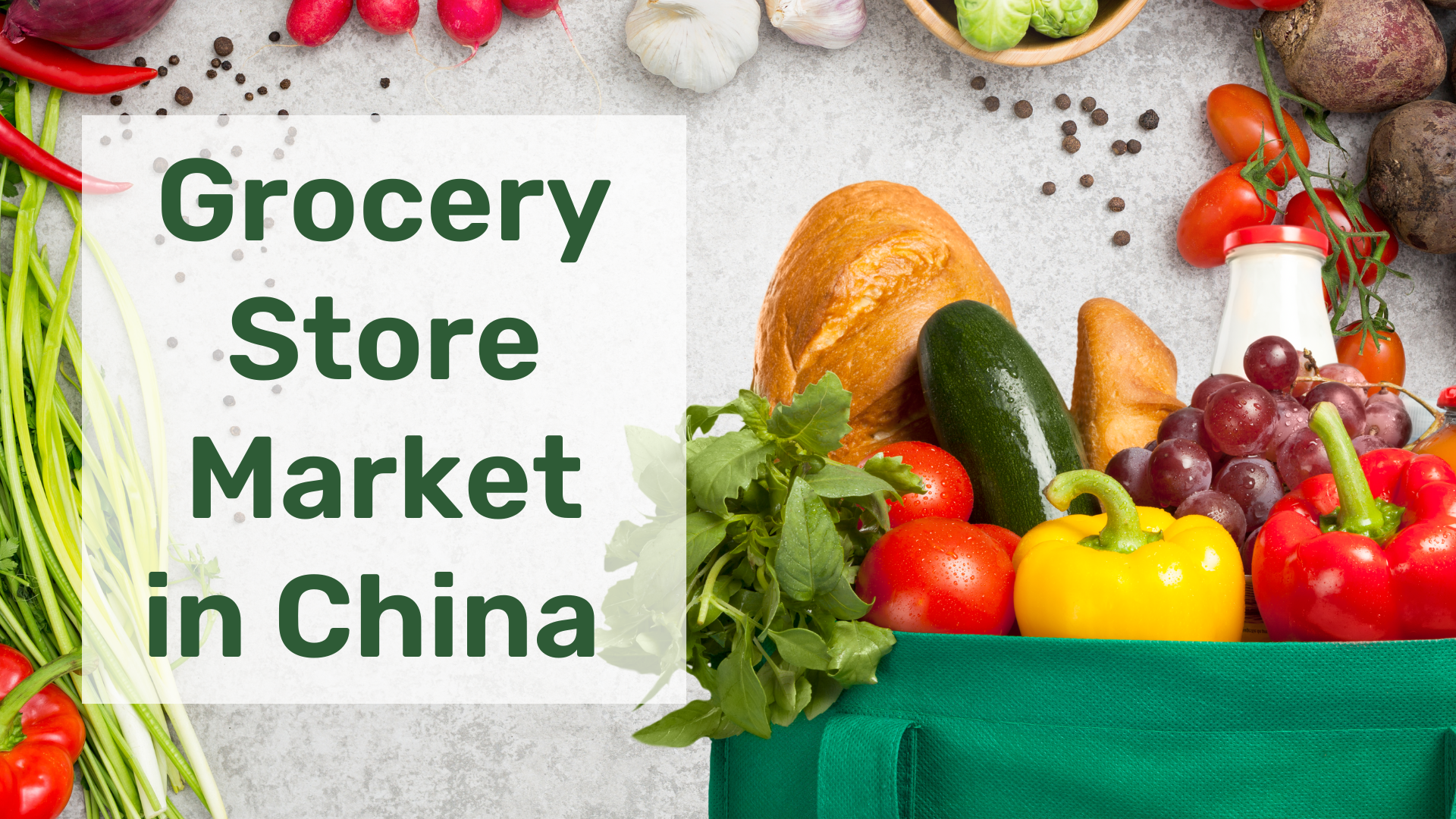
It’s no secret that online shopping is booming in China. But did you know that online grocery shopping is growing in popularity too? In a recent report, it was revealed that the share of online grocery shoppers in China has more than doubled over the past four years. This just goes to show that more and more Chinese consumers are trusting online retailers when it comes to buying their groceries.
So what are the reasons behind this surging trend and how you as food brands/producers can take advantage of it? Let’s take a look.
Cost-Effective Agency
KPI and Results focused. We are the most visible Marketing Agency for China. Not because of huge spending but because of our SMART Strategies. Let us help you with: E-Commerce, Search Engine Optimization, Advertising, Weibo, WeChat, WeChat Store & PR.
China: The World’s Biggest Online Grocery Market
IGD Asia’s recent projections indicate that China’s grocery market could soar to $2.36 billion by 2026. China is the biggest online grocery market in the world. The market is expected to burgeon by 38% through 2026, boasting a CAGR of 6.8%.

Several factors contribute to this surge. The continual urbanization is heightening the need for both convenience and efficiency. Additionally, the buying capacity of China’s online community, particularly in lower-tier cities, is on an upward trajectory.
The COVID-19 outbreak further refined consumers’ shopping habits. Now, they expect swift deliveries, a wider selection of high-quality items, and utmost convenience.
The Chinese grocery industry’s “modern trade” is projected to grow at an annual rate of 8%. Online and convenience stores will drive much-needed innovation in this traditional market, while offline retail plays a vital role in rural areas as well as many smaller cities.
Indeed, The demand for convenience and efficiency continues to drive technology development, which changes how people shop as well as what formats stores are in. Retailers have focused on community-style supermarkets or premium groceries such that they can offer their customers more options than ever before.
Reasons for the growing demand for online grocery shopping
There are 5 principal reasons for the increasing demand:
- Higher penetration of the Internet and smartphones, boosting online retail
- Increasing affluence and emerging middle-class
- The rising population of the young generation who prefers online supermarket chains
- Less shopping time (social competition and job pressure)
- E-commerce facilities (home delivery service)
The fast-paced lifestyle, booming economy, and high food safety lead to a growing interest in packaged foods. Internet use is on the rise across China which has led many people to online grocery retail as well! There’s also growth coming from demographics – there are more younger generations joining our society every day that will fuel this market even further with their spending power when they become adults

Demand
From Alaskan Crab to Italian cheese, the demand for authentic and exotic products has grown in the Chinese market. The meat, seafood, dairy, fruits, and vegetables from the US are being sold widely in the Chinese market.
Mid-budget shoppers are increasingly interested in experimenting with these products. Foreign cuisines, thanks to media for promotion, have been a major influence in the Chinese food industry which is resulting in a booming demand for such supplies.
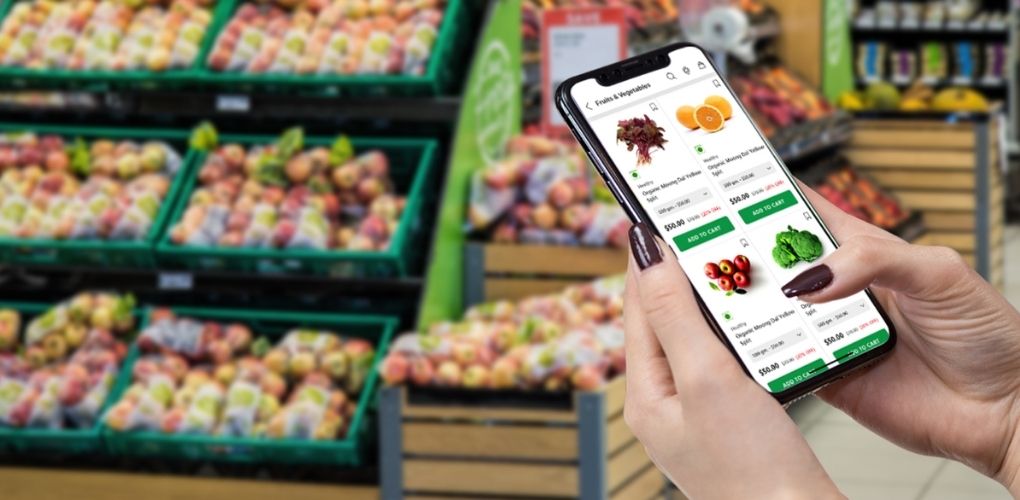
Supply
These business opportunities has been successfully utilized by the e-commerce platforms like Taobao, Pinduoduo, and JD.com. These websites have been leading providers of digital gadgets, apparel, and everyday products. But they have introduced a fresh food section to meet the growing demand for foreign products.
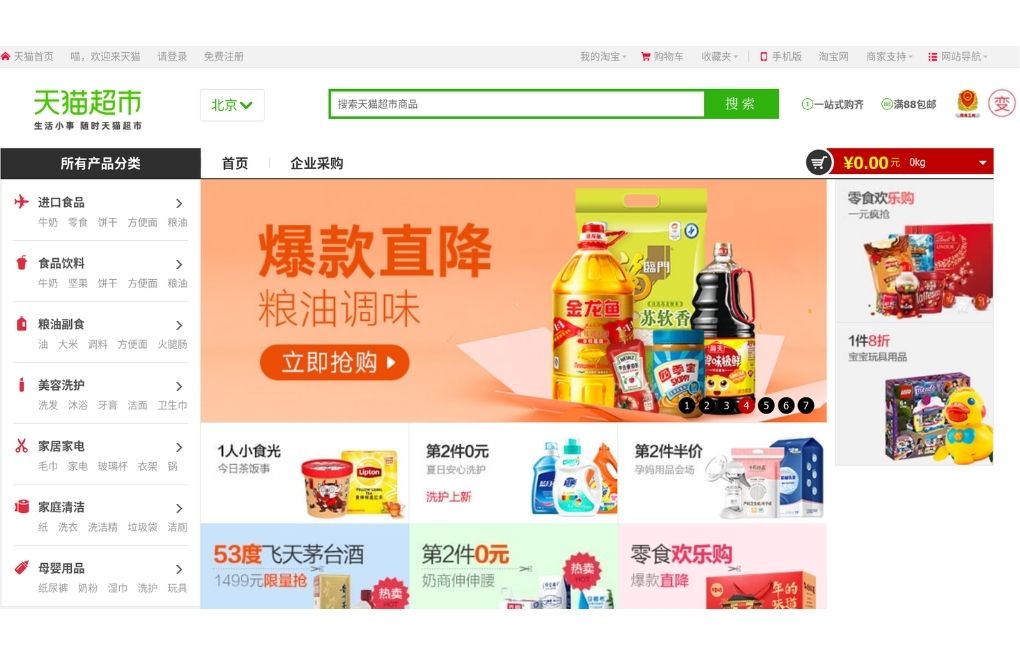
Covid-19 and Innovations
When the Chinese economy was hit by the Covid-19, it quickly became clear that brick-and-mortar and department stores and grocery retailers could no longer keep up. The supermarket industry moved to the internet, and online channels took over as people looked for ways to survive without going hungry or being unable to find medicine when their lives were threatened by this coronavirus outbreak in particular.
This caused a flashpoint between traditional retail outlets and offline sales versus e-commerce companies who offered delivery services at affordable prices during those difficult days following news reports detailing how everyone had become sick from one thing – lack of food!
Selling foreign brands on Chinese online grocery distribution platforms
One of the major challenges that have been taken care of is collaborating with wholesalers from overseas. Alibaba has launched an edible section on the Tmall website which directly allows producers from Australia and New Zealand to sell products to Chinese customers.
While for some tier cities where it is impossible to purchase exotic groceries, e-commerce platforms are channels for those people who live far away from big cities like Shanghai and Beijing to have access to imported trendy products.
Several renowned foreign brands like Quaker cereals and ocean spray juices have tied up with JD and Alibaba and are now directly selling commodities to Chinese consumers via these two websites.
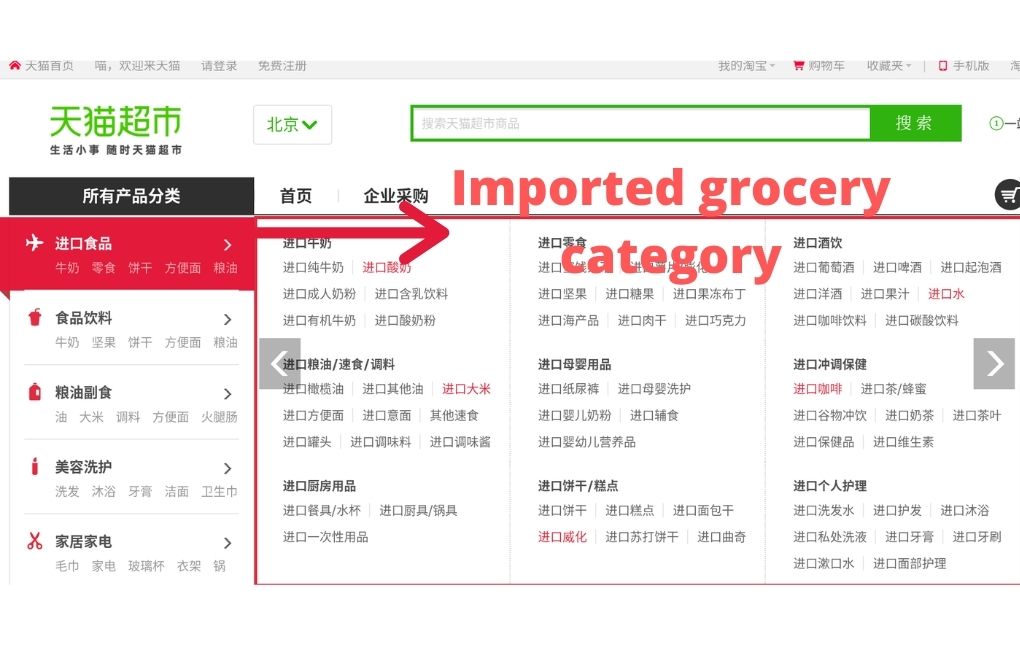
Cost optimization by online grocery channels
Believe it or not, the price of most of these fresh foreign products is much cheaper than those available in the supermarket. Several exotic products like Kiwi fruit, Mexican avocados, mackerel, live lobster, and other imported food items are available for a cheaper price.
One of the most used online food portals is Alibaba’s Taobao. This is because Alibaba and other e-commerce websites are directly working with the wholesalers and as a result, are able to make ingredients available at a cheaper price.
Foreign brands are perceived as more reliable in China
In China, consumers prefer imported dairy, baby & mother groceries as they are perceived as reliable and premium. And for the young generation, foreign snacks are very fashionable and have different and better tastes.
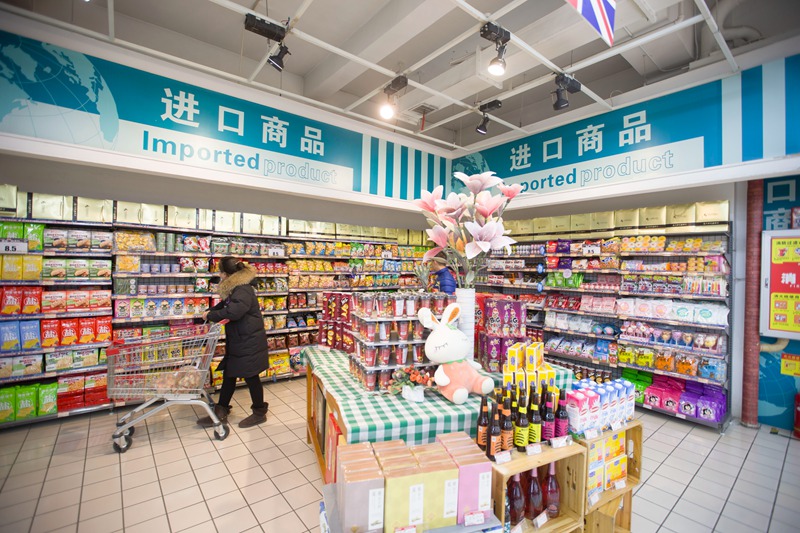
When it comes to food safety and health-related issues, Chinese products rank at the bottom. Lack of awareness, safe food processing, and negligence have made Chinese food very unsafe for consumption. Food corporations like Shuanghui International which has a big market share, and is one of China’s leading meat supplier, has been reported for the presence of maggots, harmful bacteria, and illegal additives in their meat. Yet, they continue to conduct their business.
The availability of fresh imported food has been a blessing in the Chinese market. The knowledgeable people on the mainland rely on these products rather than local products, in both online and offline sales. Food poisoning and cancer have plagued the Chinese population, and as a last resort, people head toward foreign products even, at times, at a higher price.
Benefits of online grocery selling
Instead of setting up a store, it is always beneficial to sell the commodities online. Not only does it reduce the establishment charge, but also excludes the complicated government policies which can lead to a hassle.
Tiresome legal proceedings often prevent foreign traders to set up a store in China. Moreover, the option to buy online and fast delivery services are also making online grocery purchases more popular amongst the masses. Advertising can cost a lot in China… that’s sure!
The Integration of Technology
In the evolving landscape of China’s grocery market, the incorporation of cutting-edge technology has played a pivotal role in reshaping the consumer experience and operational efficiency. Here’s a glimpse into some of these technological integrations:
- Advanced Logistics and Supply Chains: Modern grocery stores in China are leveraging sophisticated logistics systems to ensure swift and efficient delivery of goods. The optimization of these supply chains not only reduces waiting times for consumers but also minimizes potential stock shortages and wastage.
- AI and Big Data in Personalized Shopping: The use of Artificial Intelligence (AI) combined with the immense potential of big data has revolutionized the shopping experience. Retailers can now offer highly personalized product recommendations based on a consumer’s shopping history, preferences, and behavior. This tailored approach not only enhances customer satisfaction but also drives repeat purchases.
- AR and VR for Immersive Shopping: Augmented Reality (AR) and Virtual Reality (VR) are no longer just buzzwords in the tech industry. In the grocery sector, these technologies are being employed to provide customers with an interactive and immersive shopping experience. From virtual store tours to AR-based product information overlays, these tools are making shopping both fun and informative.
Incorporating these technological advancements, China’s grocery market is setting global benchmarks, ensuring both convenience and a futuristic approach for its consumers.
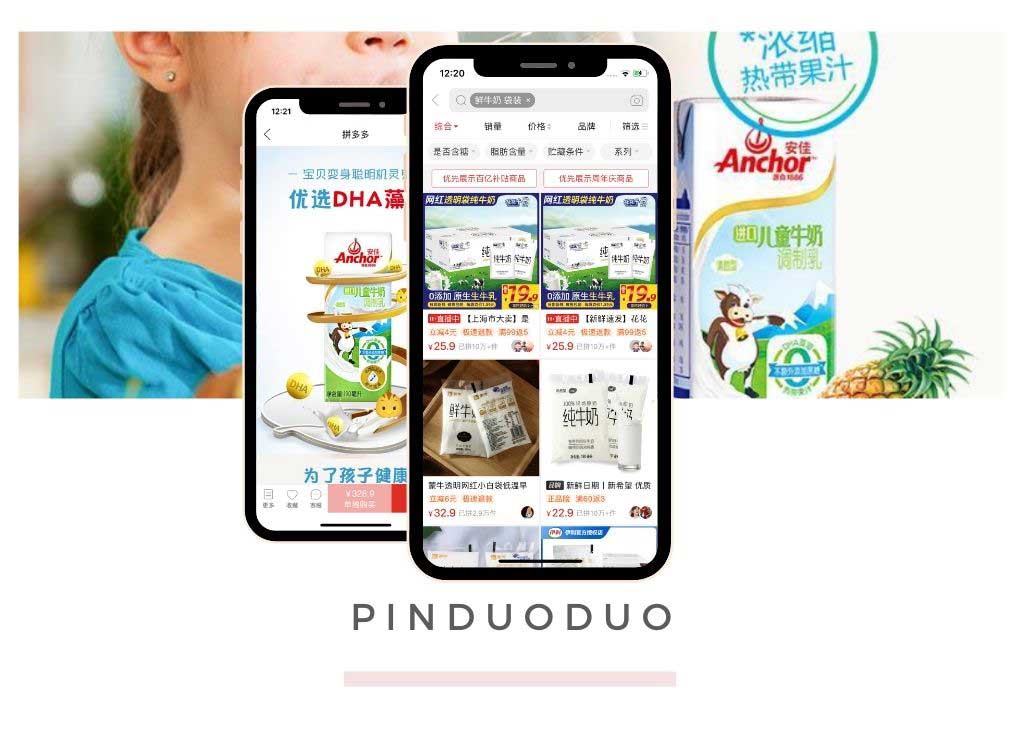
Challenges Faced by Online Grocery Platforms
The soaring trajectory of online grocery platforms in China doesn’t come without its set of challenges. As these platforms race to meet the increasing demands of consumers, they grapple with several pivotal concerns:
Ensuring Freshness and Quality
One of the primary challenges is guaranteeing the freshness and quality of perishable goods. The online nature of these platforms means they must work harder to convince customers of the produce’s integrity, from farm to table.
Logistics for Timely Deliveries
With the promise of quick deliveries, managing an efficient logistics chain becomes imperative. Ensuring that products, especially those with a limited shelf life, reach consumers in a timely manner without compromising on their quality is a delicate balancing act.
Building Consumer Trust
Traditional grocery shopping in China often involves tactile interactions—feeling the ripeness of a fruit or examining the freshness of vegetables. With the absence of this physical examination online, platforms face the task of building a level of trust where consumers feel assured about the quality and authenticity of what they’re purchasing.

Impact on Traditional Grocery Stores
The digital revolution of grocery shopping in China has posed challenges for traditional grocery stores. But, like a story of resilience, many of these brick-and-mortar shops aren’t just surviving; they’re evolving.
Take local grocery stores, for example. They’ve seen the wave of online shopping and instead of resisting, they’re adapting. Many have now incorporated the “O2O” model, short for Online-to-Offline. Here’s how it works: customers can easily order their groceries online, much like they would with purely digital platforms. But instead of waiting for home delivery, they have the option to pick up their orders in the store.
This model blends the convenience of online shopping with the trustworthiness of offline purchasing. After all, many shoppers still like to see or touch their products, especially when it comes to fresh produce.
But it doesn’t stop there. Some traditional supermarkets, recognizing the power of digital reach, are forming collaborations with big digital platforms. Think of it as a fusion of strengths. For instance, a local grocery store might partner with a digital giant like Alibaba. The store benefits from the extensive online reach and logistical prowess of the platform, while the digital platform can offer its users more localized options.
Want to Start Selling on the Chinese E-Grocery Platform?
A major section of the Chinese population is well-off and prefers premium groceries over unhealthy local products. Apart from JD and Alibaba, other grocery companies like Walmart have also launched their own food e-commerce portal. Hema offers express delivery options.
So, the grocery and food products are made available in less than 24 hours to the buyers. The flexibility, availability, and hygiene of groceries and produce are the primary reasons behind the rampant growth of food in e-commerce in China.
Chinese online grocery platforms are a great opportunity for foreign brands, especially for those companies who are not yet present in China, because they don’t have to have a physical presence in China to sell their products.

However, it is easier said than done. If you need any help, you can contact us, we will guide you hand in hand until your brand’s success. Gentlemen Marketing Agency, an expert in Chinese marketing.
Contact us, we can help you start selling in Chinese Online Supermarkets!


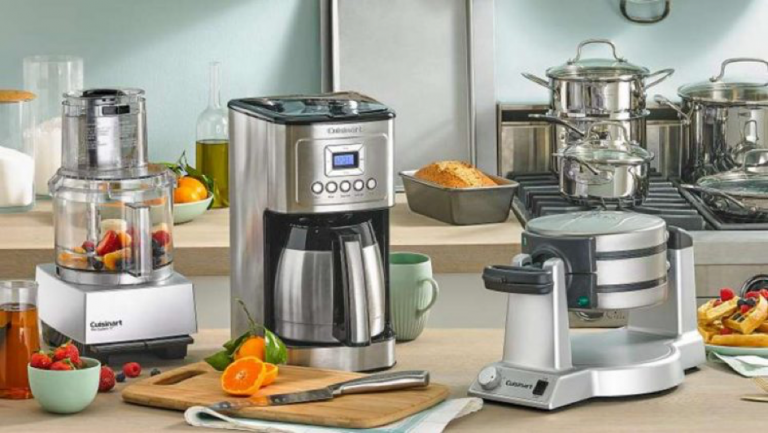




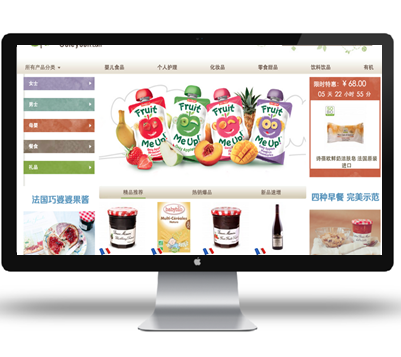
One Comment